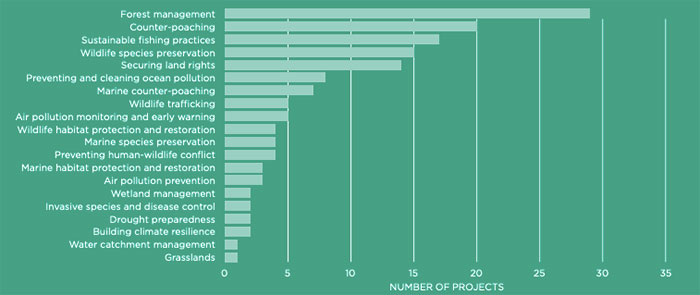In November, the UK hosts COP26 in Glasgow. We will seek to accelerate action to reduce emissions, strengthen adaptation and resilience to the impacts of climate change, scale up means of implementation, protect and restore nature, and empower inclusive action.
Yesterday’s Climate Development Ministerial, convened by the Foreign Secretary and COP26 President, is a key milestone in the run-up to November. The summit will discuss challenges and priorities for implementing the Paris Agreement and SDGs in the countries most vulnerable to climate change, including the need for innovation and practical solutions.
The UK has a strong track-record in supporting the development of innovations that have a high potential for positive socioeconomic and climate impacts. This article draws attention to the opportunities identified by a recent report on the role of mobile and digital technologies in addressing climate change. Commissioned through the Research and Evidence Division’s Mobile for Development programme, 18 high-potential interventions have been identified, spanning seven thematic areas:

We have already tested many innovations for climate change mitigation, adaptation and resilience
For years, our Research and Evidence Division has supported low-carbon and climate-resilient business models that rely on mobile technologies, several of which are highlighted within this report.
The FCDO was one of the early supporters of the pay-as-you-go solar home systems, such as M-KOPA, Fenix and PEG, that are now pioneering the off-grid clean energy industry and benefitting over 420 million people in low- and middle-income countries.
Through the GSMA ClimateTech Programme, we identified hotspots for real-time digital monitoring, community engagement and payments for ecosystem services in forest management, wildlife conservation and sustainable fishing practices (see below graph from a 2020 GSMA report that maps the use cases for digital in over 130 projects reviewed).

In agriculture, several projects have been funded to support smallholder farmers to respond to climate-induced changes. The use of digital tools for agricultural information and advisory, smart farming and agri-ecommerce (see Twiga foods) is well known. “Virtual sensing” is an interesting new technology use case, that allows the collection of weather data through smartphones, connected cars and commercial microwave links (CMLs) used in mobile networks to transmit signals.
Digital solutions can enable more effective waste management by improving processes throughout the value chain, from the collection, processing and recycling of solid waste and wastewater (see Coliba). Equally, it is important to consider the implications of e-waste produced by using these mobile technologies. In 2019, 53.6 million tonnes of e-waste were generated worldwide, of which 82 per cent is either handled by the informal sector or ends up in a landfill, leading to atmospheric, water and land pollution (see here for a GSMA dashboard on the scale of global e-waste).
Digitisation has shown a clear reduction in non-revenue water that’s lost to leakage, theft or inaccurate meters (see Wonderkid), helping water utilities invest in building climate-resilient water and sanitation infrastructure. Mobile big data can also support future-fit urban planning for these utilities and other essential services such as mobility.

Mobile technology also plays a critical role in providing early warnings for disasters, such as localised heatwaves or flooding, while call detail records (CDR) can be key in cost-effectively collecting real-time data to better coordinate humanitarian responses (see Flowminder). Further, as cash assistance is increasingly acknowledged as a dignified and effective way to help affected populations rebuild or protect livelihoods, mobile money is being used to deliver digital assistance through cash-based transfers.
Accelerating climate action requires stronger and effective collaboration
As the mobile industry continues to invest in network infrastructure and in bridging the ‘usage gaps’ to drive digital inclusion, there is a need to speedily test and scale innovation in climate-focussed technologies.
Yesterday’s Climate Development Ministerial will provide an opportunity for donors and developing nations to discuss practical solutions to climate challenges. It is plain there is much more to be done. Countries must go further, urgently, and no country should be left behind without the opportunity to deliver climate action that creates jobs, cuts emissions and protects from climate change impacts. This requires strong and effective global partnerships between the mobile industry, governments, investors and innovators.





